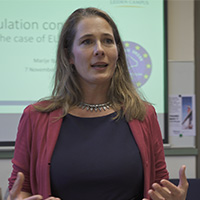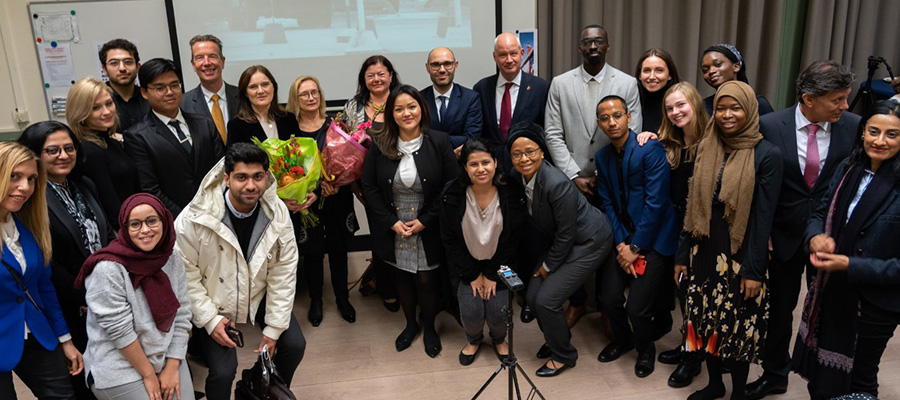Leiden Commemorates the Fall of the Berlin Wall
November 18, 2019

On Nov. 7, Webster University's Leiden Campus commemorated the 30th anniversary of the fall of the Berlin Wall with the four-hour program on the topic.
“30 Years After the Fall of the Berlin Wall - Pax Europeana or Securitization of Europe?” was hosted by the international relations department, and two student clubs — Model United Nations Association MUNA and the International Relations Club. The event included two simulation games and Ambassadors’ Discussion Panel.
Both simulations allowed for students to take a step back in time to research, understand and articulate the concerns of leaders advocating for what they believed to be best for their people. Under the leadership of the international relations faculty, Jill Adler, in a Model United Nations simulation, students demonstrated role-play of key countries that were impacted by the creation and destruction of the Berlin Wall. The Model United Nations class is offered by Dr. Adler every spring at Webster Leiden campus and could be taken for elective credits in any of the Webster undergraduate programs.
In a separate simulation, led by the former diplomat and Professor Marije Balt, students recreated the complexities of countering terrorism by the European Union training mission in the conflict zone in Mali and the Sahel.

Following the simulation games, the attendees had a rare opportunity and honor to participate on a panel with four esteemed ambassadors of Austria, Croatia, Poland and the United Kingdom. The International Relations department head, Dr. Nives Rumenjak, moderated a two-hour intimate panel discussion in which ambassadors spent time sharing their views on the political evolution of Europe in the last 30 years, including a special focus on the current state of the European Union and its further integration.
A question and answer session was opened by the graduate international relations student, Jasmine Tran, with complex questions for British Ambassador, H.E. Mr. Peter Wilson. With Brexit looming and the controversial implications this might have on the E.U., security, immigration, and a variety of key issues, the Ambassador of the U.K. carefully answered students’ questions. While reassuring the U.K.'s deep and genuine concern for the stability and security of the European Union, the Ambassador did his best to emphasize a positive outcome despite deep concerns from the audience members.
 Webster Leiden Campus ambassadors of Croatia, Austria, Poland and Great Britain
Webster Leiden Campus ambassadors of Croatia, Austria, Poland and Great Britainduring the simulation
Putting personal views aside, it was important to witness how each ambassador protected the interests of her or his own country and people as this is the duty and sacrifice of their job. The Webster Leiden community witnessed firsthand the importance of diplomatic service and the deep impact it can have by promoting positive changes in government, policy, and peaceful relationships with other countries.
Comments from Students and Panel
Undergraduate international relations student Sarah Patton’s impressions from the panel are shared by many Webster Leiden students:
“Thursday's event, which was hosted by the international relations department, was unlike any event I have attended at Webster. Students were able to gain exposure to not only one but four ambassadors that sat together on a panel. As they discussed the impacts from the fall of the Berlin Wall 30 years ago, we were able to draw parallels to present-day populism and how important integration remains, evoking discussion among the students and ambassadors. I must also note that the female representation among the panel was a particular favorite of mine that further sparked my interest and inspiration in pursuing a career in international relations.”
Sarah Patton commented:
“Professor Balt led us in bilateral negotiations in which she hit us with ‘real-time’ news events that would completely alter our negotiations, forcing us to think outside the box and get creative in order to reach a resolution.”
